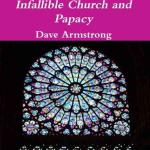***
Brazilian Protestant
Juan Roberto de Oliveira is the author of the book,
Nenhum Caminho Leva a Roma: O pecurso até o protestantismo [
No Road Leads to Rome: The Path to Protestantism]. It has no date or publisher listed. But it was “recently released.” He’s a
“law graduate” and is
active on Twitter (now “X”) and, especially,
Instagram. When I informed Juan of my replies, he quickly wrote on Twitter:
“I’ll be rebutting your rebuttals.” I wish him all the best in that endeavor. If anyone discovers that he has ever answered any of my critiques, please let me know.
*
His words will be in
blue. Translations from the Portugese of his book will be made with Google Translate (with an occasional additional modification). I will use RSV for Bible translations.
*
*
In light of this new information, this will be my last critique. It’s a shame, because I was enjoying myself so much, and I felt that I came up with some fresh arguments, but this book deserves no further response. It was already a very weak, poor volume (desperately in need of an editor), even if these factors weren’t in play. What I have written thus far has, in my opinion, value in and of itself, as a ten-part Catholic apologetics “course.” So it wasn’t a waste of time at all. But no more. I’m only interested in responding to serious, adequately researched, honest apologetics.
*
*****
Jesus never used tradition, but always responded according to the scriptures. (p. 7)
*
When Jesus was tempted by the Devil in the desert, Satan used the scriptures to try to deceive Jesus. But Jesus answered back by also using the scriptures. Jesus referenced scripture in reply to every question from Satan, and in so doing, Jesus defeated him. (p. 8)
*
Yes, in that instance (see Dt 8:3) and usually in His responses, He cited Scripture, but not always. Juan did something that is one of the biggest mistakes of any debater: he asserted a universal negative (“Jesus never used tradition, but always . . .”). All one has to do is offer one instance where Jesus didn’t do this, to refute the silly assertion. And that’s easy to do. My friend David Palm ably explained what is perhaps the clearest example of Jesus utilizing extrabiblical tradition, in his classic article, “Oral Tradition in the New Testament” (This Rock, May 1995; now reprinted at EWTN):
Just before launching into a blistering denunciation of the scribes and Pharisees, Jesus delivers this command to the crowds: “The scribes and Pharisees sit on Moses’ seat; so practice and observe whatever they tell you, but not what they do; for they preach, but do not practice” (Matt. 23:2-3).
Although Jesus strongly indicts his opponents of hypocrisy for not following their own teaching, he nevertheless insists that the scribes and Pharisees hold a position of legitimate authority, which he characterizes as sitting “on Moses’ seat.” One searches in vain for any reference to this seat of Moses in the Old Testament. But it was commonly understood in ancient Israel that there was an authoritative teaching office, passed on by Moses to successors.
As the first verse of the Mishna tractate Abôte indicates, the Jews understood that God’s revelation, received by Moses, had been handed down from him in uninterrupted succession, through Joshua, the elders, the prophets, and the great Sanhedrin (Acts 15:21). The scribes and Pharisees participated in this authoritative line and as such their teaching deserved to be respected.
Jesus here draws on oral Tradition to uphold the legitimacy of this teaching office in Israel. The Catholic Church, in upholding the legitimacy of both Scripture and Tradition, follows the example of Jesus himself.
As a second counter-example, Jesus’ famous teaching on lust in the Sermon on the Mount was not derived from the Old Testament text, but rather, from the oral Torah, that the Jews believed that Moses received on Mt. Sinai. Jesus said, “every one who looks at a woman lustfully has already committed adultery with her in his heart” (Mt 5:28).
*
Nothing remotely like this appears in the 39 Protestant-approved Old Testament books. “Lust” appears nine times, but not with any similarity to this passage. A proximity search of “adultery” and “heart” yields nothing. It looks like Jesus was drawing from a rabbinical source that claims to preserve the oral Torah; specifically: “You must not suppose that only he who has committed the crime with his body is called an adulterer. If he commits adultery with his eyes he is also called an adulterer” (Leviticus Rabbah 23:12; cf. Kallah, ch.1).
Some Protestants read the accounts of Jesus’ conflicts with the Pharisees and get the idea that He was utterly opposed to all tradition whatsoever. This is false. A close reading of passages such as Matthew 15:3-9 and Mark 7: 8-13 will reveal that He only condemned corrupt traditions of men, not tradition per se. He uses qualifying phrases like “your tradition,” “commandments of men,” “tradition of men.”
As a third example of what Juan claims “never” happened, Jesus said, “For truly, I say to you, till heaven and earth pass away, not an iota, not a dot, will pass from the law until all is accomplished” (Mt 5:18). This likely was reflective of Leviticus Rabbah 19:2: “Should all the nations of the world unite to uproot one word of the Torah, they would be unable to do it.”
As a fourth counter-example, consider Jesus’ saying, “The sabbath was made for man, not man for the sabbath” (Mk 2:27). This thought appears in the Talmud: “Rabbi Jonathan ben Joseph said: For it is holy unto you; I.e., it [the Sabbath] is committed to your hands, not you to its hands” (Yoma 85b; cf. Mekilta 103b), and the Pharisaical school of Hillel was famous for using it.
As a fifth example of what Juan claims “never” happened, Jesus said, “Have you not read what David did, when he was hungry, and those who were with him: how he entered the house of God and ate the bread of the Presence, which it was not lawful for him to eat nor for those who were with him, but only for the priests?” (Mt 12:3-4). The oral Torah agrees that basic needs of life supersede Sabbath restrictions, and even use the same example of David eating the showbread, that Jesus used (see Y’lomm’denu, Yalkut II, par. 130; Tosefta Shabbat 15b).
*
As a sixth counter-example, Jesus observed Hanukkah (“It was the feast of the Dedication at Jerusalem; it was winter, and Jesus was walking in the temple, in the portico of Solomon”: Jn 10:22-23). This is not found in the Torah or any of the 39 Old Testament books, according to Protestantism. But it’s found in 2 Maccabees 10:6-8, in the Deuterocanon accepted by Catholics, but not accepted by Protestants (and called by them “the Apocrypha).
*
In fact, one can find similar sayings in rabbinical writings to virtually all of Jesus’ statements. Here are several more examples:
*
7) Matthew 25:45: “Then he will answer them, ‘Truly, I say to you, as you did it not to one of the least of these, you did it not to me.'” Compare: “One who betrays his fellow, it is as if he has betrayed God” (Tosefta Sh’vuot, ch. 3).
*
8) Matthew 5:21-22: “You have heard that it was said to the men of old, ‘You shall not kill; and whoever kills shall be liable to judgment.’ But I say to you that every one who is angry with his brother shall be liable to judgment; whoever insults his brother shall be liable to the council, and whoever says, ‘You fool!’ shall be liable to the hell of fire.” Compare: “He who publicly shames his neighbour is as though he shed blood” (Talmud: Bava Mezia 58b).
*
9) Matthew 5:45: “he . . . sends rain on the just and on the unjust.” Compare: “rain is both for the righteous and for the wicked” (Talmud: Taanit 7a).
*
10) Matthew 6:31, 34 “Therefore do not be anxious, saying, `What shall we eat?’ or `What shall we drink?’ . . . do not be anxious about tomorrow, for tomorrow will be anxious for itself. Let the day’s own trouble be sufficient for the day.” Compare: “Rabbi Eliezer the Great declares: Whoever has a piece of bread in his basket and Says. ‘What shall I eat tomorrow?’ belongs only to them who are little in faith” (Talmud: Sotah 48b).
*
11) Matthew 5:37 “Let what you say be simply ‘Yes’ or ‘No’ . . .” (cf. Jas 5:12). Compare: “A righteous yes is a Yes; a righteous no is No” (Talmud: Bava Batra 49b).
*
12) Matthew 11:25 “Father, Lord of heaven and earth, that thou hast hidden these things from the wise and understanding and revealed them to babes.” Compare: “Rabbi Johanan said: Since the Temple was destroyed, prophecy has been taken from prophets and given to fools and children” (Talmud: Bava Batra 12b).
*
13) Matthew 5:30 “And if your right hand causes you to sin, cut it off and throw it away; it is better that you lose one of your members than that your whole body go into hell.” Compare: “Rabbi Tarfon said, ‘If his hand touched the membrum let his hand be cut off upon his belly. . . . It is preferable that his belly shall be split rather than that he should go down into the pit of destruction’ (Talmud: Niddah 13b).
*
***
*
*
Or you may believe my work is worthy to support for the purpose of apologetics and evangelism in general. If so, please seriously consider a much-needed financial contribution. I’m always in need of more funds: especially
monthly support. “The laborer is worthy of his wages” (1 Tim 5:18, NKJV). 1 December 2021 was my 20th anniversary as a
full-time Catholic apologist, and February 2022 marked the 25th anniversary of my blog.
*
*
***
*
Summary: Brazilian Protestant Juan Roberto de Oliveira claimed that Jesus “never used tradition”: only the [Protestant] Bible. I provide thirteen counter-examples / refutations.














